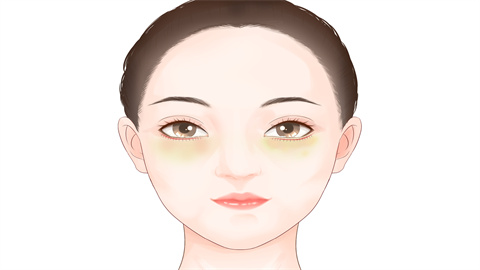What causes under-eye swelling?
Under normal circumstances, eye bag swelling may be caused by excessive water intake before sleep, crying, allergic conjunctivitis, hypothyroidism, glomerulonephritis, and other factors. If discomfort occurs, it is recommended to seek medical examination and treatment at a hospital promptly. Detailed analysis is as follows:

1. Excessive Water Intake Before Sleep
If a large amount of water is consumed before bedtime, the body's metabolic rate slows down during sleep, and the kidneys' ability to metabolize water decreases correspondingly. Excess water cannot be expelled from the body in time and may accumulate in loosely structured areas, such as around the eyes, leading to eye bag swelling. It is recommended to reduce water intake 1–2 hours before bedtime and avoid excessive drinking.
2. Crying
Crying causes dilation of blood vessels around the eyes, increasing blood flow to this area. Simultaneously, the lacrimal glands secrete large amounts of tears. Frequent eye rubbing during crying further aggravates irritation and damage to the eye tissues, increasing the exudation of tissue fluid, which results in swollen eye bags. Typically, the swelling subsides on its own after a period of rest.
3. Allergic Conjunctivitis
Allergic conjunctivitis is often caused by allergens irritating the conjunctiva, potentially leading to conjunctival congestion and edema, which can cause eye bag swelling. It is commonly accompanied by symptoms such as eye itching, tearing, and foreign body sensation. Treatment involves avoiding allergens and using medications such as emedastine difumarate eye drops, azelastine hydrochloride eye drops, or olopatadine hydrochloride eye drops under a doctor's guidance.
4. Hypothyroidism
Hypothyroidism is primarily caused by autoimmune abnormalities, thyroid surgery, or radioactive iodine therapy. Decreased thyroid hormone secretion leads to a reduced basal metabolic rate, causing mucinous edema in the body. When the eyes are affected, eye bag swelling can occur. Symptoms may include fatigue, cold intolerance, and excessive sleepiness. Patients should use medications such as levothyroxine sodium tablets, thyroid extract tablets, or dexamethasone acetate tablets under a doctor's supervision to alleviate symptoms.
5. Glomerulonephritis
Glomerulonephritis is often caused by immune-mediated inflammatory reactions. It may impair the filtration function of the glomeruli, leading to water and sodium retention. Excess fluid in the body accumulates in loose tissues such as the eyelids, causing eye bag swelling. Symptoms may also include hematuria and proteinuria. Patients can use medications such as valsartan capsules, benazepril hydrochloride tablets, or hydrochlorothiazide tablets under a doctor's guidance for treatment.
In daily life, maintaining good作息 habits, avoiding staying up late for long periods, controlling salt intake, and maintaining a balanced diet are important. Eye massage, warm compresses, and other methods can also help promote blood circulation around the eyes and reduce eye bag swelling.








